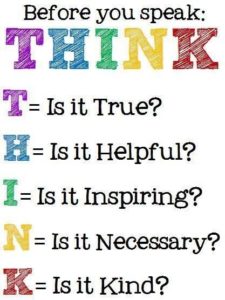Social platforms had become a way of life. Spam emails and calls are unstoppable. And there’s no proper education in producing and publishing content. Considering this, do we still know how to actually be socially appropriate?
Being a mom in this era of internet and technology is quite challenging. I understand the shift of television and radio into the online stream via YouTube and podcasts. In a way, I know how to filter good quality content from those who just want to make money out of it.
The other day, I was writing and my daughter was watching YouTube. I have made playlists for her but for some reason, she had come across a disturbing video made by insensitive human beings. It just caught my attention because I thought, the video looked oddly focused. It was a star-studded one with Joker, Elsa, Spiderman and a lot more involving poop. Yes, it does exist. Here is a sample:
I am blessed to have a smart little girl who when I told her that’s not a good video, she immediately presses out of it to have a refreshed feed of cartoons. You may throw stones at me for allowing her to use YouTube. I may need a bit of disciplining on that side which I have started by limiting her access to it and introducing different programs that are interactive and engaging in a mentally stimulating way. (Netflix has it and Disney Appisodes and so are game apps like Hello Kitty and many more.)
My nanny has a daughter of her own. She turned into a teenager officially this year. We constantly exchange worries as we get a fair share of spam callers getting instantly dismissed. Sporadic porn sites are part of the advertisements. Moreover, trading sites that promise instant monetary compensation had become more aggressive than ever.
LET’S GET REMINDED
It is undeniable that our kids contain the internet DNA naturally. I’m 35 years old now embracing social media as well. This means I am living as a millennial but I was born in the 80’s. It was the very gateway towards invention of computers that would cater to the advancement internet could bring.
Maybe that’s why I know how to filter good and bad content. Because I grew up using the library, the typewriter, and I ran listening to my heartbeat and feeling the heat of the sun more than researching everything in google and looking up the several kilometres I did via an app.
Probably you already have your own ways in disciplining your kids. But I see that with social networks’ aim of making global connections possible, intimate relationships suffer. As parents, I urge you to discuss this issue. Don’t be succumbed with the false belief that you get engaged socially via personal accounts in Facebook, Twitter and LinkedIn. I would still stay talking personally to your kids should be maintained and much preferred above all forms of communication. Start them young or so I would say.
It’s not just rude that they are glued to their phones while being in a party. It’s making them miss life as it happens because they never look up. And as a reminder of how we came about in this world, check out this video:
At one point, we may not be able to cope up with these different inventions and innovations in technology but it’s critical to still impose morals as a parent. Interestingly, I came across this book that could serve as good guide in helping out with developing your child’s social skills.
It gets me thinking, how is my daughter going to thrive socially?
While it may need a lot of practice, here are the tips and strategies to aid a child in developing proper social language and giving him more confidence and willingness to engage socially in public with others.
1. If a child makes a statement that is replete with grammatical and syntactical errors (“I folded my cousin’s hamster on yesterday”), do not scold or even correct the child at that time.
Research on language development indicates that if you constantly correct a child’s language or reprimand him for poor grammar, he will generally respond by avoiding conversations and refusing to take part in discussions. His logical reasoning is: “The less I talk, the fewer mistakes I am likely to make.” Rather, respond by letting him know that he did communicate a message and then reframe his message using correct grammar: “It must be fun to hold an animal that is so soft.”
2. Provide the child with opportunities to have language experiences with a variety of people in many social situations.
ex.: “Billy, go ask the waiter if they have a Sunday brunch here.” or “Sally, go ask Grandpa what time his dentist appointment is.”

3. Many children have difficulty telling a story or recounting an experience in the correct chronological order.
Assist by providing “prompts” in the form of words and phrases designed to remind him of the next phase of the story. Avoid completely taking over by storytelling when he has difficulty sequencing the events.
ex.: “Billy, you’ve got it all wrong. Let me tell Grandpa what happened.”
4. Older siblings, relatives or friends can be of great help in developing a child’s conversational skills.
They usually discuss topics of interest to the child. (e.g. sports, popular music, video games) and he will be greatly motivated to take part actively and appropriately in these high-interest discussions.
5. Successful conversations are rooted in common ground.
Encourage the child to find some trait or interest that he shares with his prospective conversation partner to make the interaction more meaningful.
6. Encourage children to ask questions during conversations and reinforce them when they do.
But remind them that the questions they ask should be related to their conversation topic and should be designed to enhance the discussion. I recall regaling an applying student with tales of our school’s athletic program. I then asked if he had any questions. He said, “Yes, do you have sports here?” His question gave the distinct impression that he had not been listening to our conversation.
7.Instruct the child to avoid beginning a conversation by saying, “What’s up?” or “What’s new?”
This gives his conversation partner the impression that it is his duty to entertain the questioner and that the child does not intend to take part actively or equally in the interaction. Rather, remind the child of the volleyball analogy. It is his job to set up his partner by asking a question that will yield a solid, informative response. The question should be more specific:
ex.: “What did you think of that thunderstorm last night?” or “How was your trip to Boston?”
8. Teach the child how to give and receive compliments.
Children often feel uncomfortable when are given a compliment and may respond inappropriately by denying or refuting the praise,
ex. : “Ben, I really love that sweater.” “It’s an old one and it has a tear in the back.”
I should have work the blue one that I got for my birthday.”
9. When giving instructions, directions or commands to a child with a learning problem, avoid abstractions and generalisations.
ex.: “When we go to uncle Jim’s, I want you to be good” or “We can leave for the game when you are ready.”
…. INSTEAD, give more precise instructions …..
“When we go to Uncle Jim’s house, don’t tease the dog or go into the woodshop.” or “We can leave for the game when your bed is made and you have put your socks uniform in the hamper.”
10. If your child has difficulty meeting new people and initiating conversations, help him to prepare a brief
ex.: “My name is Paul and I am in the fifth grade. My dad is a veterinarian, and we have a clinic and kennel. I help him fee the animals and keep them clean.”
11. Each evening, tell the child about your day and must him to listen and respond.
Then ask about and discuss his day. This daily process, conducted in a spirit of warmth, interest and acceptance can greatly enhance a child’s conversational skills.
12. Provide the child with opportunities to practice a variety of conversational skills, including:
- asking/answering questions
- receiving/giving instructions
- giving/receiving compliments
- receiving/giving apologies
- giving/asking permission
- negotiating
- giving/receiving complaints
- making/responding to an accusation
- giving/gathering information
- beginning/interrupting/ending a conversation.
13. At some time, the child will be required to take part in each of the preceding types of conversations.
You can do much to make sure her successful participation by practicing and role-playing the discussion in a positive, non-judgemental, and supportive setting.
14. Parents are often troubled by a child’s tendency to use “back talk” and this behaviour is often interpreted as rude and disrespectful.
However, perhaps this back talks is merely an immature and inappropriate attempt to negotiate. The child is saying, “I hate this show and you’d better change the channel now!” when his intended message is, “I really want to watch my favourite cartoon for a while.” Therefore, it is crucial that you attempt to separate the message from the language. Assist the child in developing negotiating skills. They will be useful in innumerable future social settings.
15. The old adage “Fight fire with fire” is ineffective when dealing with back talk.
Avoid responding to the child’s rudeness with your rudeness. If you instantly lash back at the child, he will be hesitant and fearful to express his needs or opinions. Rather, teach him how to express himself appropriately. Don’t interrupt his tirade. Wait until he is done and then calmly explain that his behaviour was intolerable and unproductive. Provide him with language strategies that would be more successful in meeting his needs. then discuss his requests only when he has rephrased and reframed them.
16. Emphasize that the child can use one of four methods to communicate his needs: direct, indirect, polite and impolite.
Situation: The child’s brother used her bicycle without her permission.
Direct = “Don’t ever take my bike again.”
Indirect = I really needed my bike this afternoon.”
Polite = “Please ask me the next time you need my bike. If I’m not using it, you can borrow it.”
Impolite = “Never, ever borrow my stuff again.”
- Advise her that polite/indirect is generally more effective and proper than impolite/direct!
17. Remind the child that if someone asks him a question it is both proper and expected that the child will ask a similar question of his conversation partner.
ex. “Good morning, Don. how was your weekend?”
“It was terrific. My dad took me to the boat show and then we met my uncle at a real neat Chinese restaurant. How was your weekend?“
Crucial to a person’s development is its ability to express its creativity, ideas, intentions and emotions. It is the foundation of effective communication. As parents, we have to set up this skill to our kids responsibly. So that as they give to society’s largest connecting platform which is the internet, they could produce something real and useful.
Ultimate source of these strategies.


